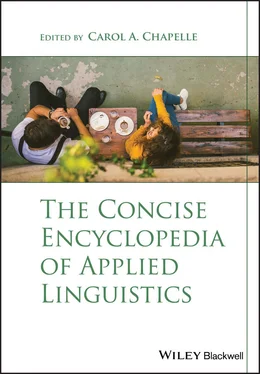Miriam A. Locher, University of Basel, Switzerland
Shawn Loewen, Michigan State University, USA
Michael H. Long, University of Maryland, USA
Roy Lyster, McGill University, Canada
Marijana Macis, Manchester Metropolitan University, UK
Elizabeth Stallman Madden, University of Minnesota, USA
Holbrook Mahn, University of New Mexico, USA
Roy C. Major, Stanford University, USA
Theodoros Marinis, University of Konstanz, Germany
Waldemar Martyniuk, Jagiellonian University, Poland
Aya Matsuda, Arizona State University, USA
J. Greg McVerry, Southern Connecticut State University, USA
Detmar Meurers, University of Tübingen, Germany
Tommaso M. Milani, University of Gothenburg, Sweden
Andrew Moody, University of Macau, Macau
Brian Morgan, York University, Canada
Paul Nation, Victoria University of Wellington, New Zealand
Phuong Nguyen, Iowa State University, USA
Catherine Nickerson, Zayed University, United Arab Emirates
Andrea Nini, University of Manchester, UK
Christiane Nord, University of the Free State, South Africa
Sigrid Norris, University of Freiburg, Germany, and Auckland University of Technology, New Zealand
Bonny Norton, University of British Columbia, Canada
W. Ian O’Byrne, College of Charleston, USA
Gary J. Ockey, Iowa State University, USA
Brian Paltridge, University of Sydney, Australia
Alan Partington, University of Bologna, Italy
Katie Patterson, University of Roehampton, UK
Saija Peuronen, University of Jyväskylä, Finland
Robert Phillipson, Copenhagen Business School, Denmark
Lia Plakans, University of Iowa, USA
Christos Pliatsikas, University of Reading, UK
James E. Purpura, Teachers College, Columbia University, USA
Mart Rannut, Integration Research Institute, Estonia
Paul Rayson, Lancaster University, UK
John Read, University of Auckland, New Zealand
Shannon Reierson, University of New Mexico, USA
Karen Risager, Roskilde University, Denmark
Hanna Risku, Danube University Krems, Austria
Peter Robinson, Aoyama Gakuin University, Japan
Carsten Roever, University of Melbourne, Australia
Jesús Romero‐Trillo, Universidad Autónoma de Madrid, Spain
Kathryn Roulston, University of Georgia, USA
June Ruivivar, Concordia University, Canada
Cristina Sanz, Georgetown University, USA
Peter Sayer, Ohio State University, USA
Jonathan Schmidgall, Educational Testing Service, USA
Norbert Schmitt, University of Nottingham, UK
Paul Seedhouse, Newcastle University, UK
Margret Selting, University of Potsdam, Germany
Jérémie Séror, University of Ottawa, Canada
Philip M. Shaw, Stockholm University, Sweden
Aki Siegel, Linnaeus University, Sweden
Tove Skutnabb‐Kangas, University of Roskilde, Denmark (retired), and Åbo Akademi University, Finland
Graham Smart, Carleton University, Canada
Marguerite Ann Snow, California State University, Los Angeles, USA
Suhad Sonbul, Umm Al‐Qura University, Saudi Arabia
Nina Spada, University of Toronto, Canada
Helen Spencer‐Oatey, University of Warwick, UK
Stefanie Stadler, Nanyang Technological University, Singapore
Jakob Steensig, Aarhus University, Denmark
Fredricka L. Stoller, Northern Arizona University, USA
Neomy Storch, University of Melbourne, Australia
Ruslan Suvorov, University of Hawai‘i at Mānoa, USA
Merrill Swain, OISE University of Toronto, Canada
Christine M. Tardy, University of Arizona, USA
Elaine Tarone, University of Minnesota, USA
Brian Tomlinson, University of Liverpool, UK, Shanghai International Studies University, China, and Anaheim University, USA
Vincenza Tudini, University of South Australia, Australia
Carolyn E. Turner, McGill University, Canada
Maria Tymoczko, University of Massachusetts, Amherst, USA
Rachelle Udell, Georgia State University, USA
Ema Ushioda, University of Warwick, UK
Georges Daniel Véronique, Université de Provence, France
Laura Vilkaitė‐Lozdienė, Vilnius University, Lithuania
Sonca Vo, Iowa State University, USA
Johannes Wagner, University of Southern Denmark, Denmark
Judy Wakabayashi, Kent State University, USA
Xiaomei Wang, Xiamen University Malaysia, Malaysia
Paige Ware, Southern Methodist University, USA
Mark Warschauer, University of California, Irvine, USA
Yuko Watanabe, OISE University of Toronto, Canada
Stuart Webb, Western University, Canada
Martin Wedell, University of Leeds, UK
Jennifer M. Wei, Soochow University, Taiwan, Province of China
Li Wei, Birkbeck College, University of London, UK
Albert Weideman, University of the Free State, South Africa
Terrence G. Wiley, Arizona State University, USA
Paula Winke, Michigan State University, USA
Alison Wray, Cardiff University, UK
Xiaoming Xi, Educational Testing Service, USA
Tomoko Yashima, Kansai University, Japan
Lisa Zawilinski, University of Hartford, USA
Nicole Ziegler, University of Hawai‘i at Mānoa, USA
Eve Zyzik, University of California, Santa Cruz, USA
Introduction to The Concise Encyclopedia of Applied Linguistics
CAROL A. CHAPELLE
The Concise Encyclopedia of Applied Linguistics introduces readers to language‐related issues that arise in the real world where languages are learned and used. It is a reference work compiled from the more extensive Encyclopedia of Applied Linguistics , which in 2019 was available in close to 1,000 libraries and professional organizations throughout over 50 countries worldwide. 1 Usage data from the electronic versions of The Encyclopedia of Applied Linguistics were consulted to create The Concise Encyclopedia of Applied Linguistics by updating 180 of the most accessed entries from the Encyclopedia . The Concise Encyclopedia of Applied Linguistics was created to offer readers a vivid picture of the range of issues and research approaches in the diverse field of applied linguistics.
Defining Applied Linguistics
Applied linguistics is a field of inquiry that addresses language‐related problems typically occurring in situations of language contact and technological innovation. In these settings, language problems include, for example, explaining misunderstandings in face‐to‐face oral conversation, making decisions about official languages for the government at a national or regional level, diagnosing language competencies of language learners, and building automated speech recognition systems for businesses. Language contact refers to situations in which people speaking different languages need to communicate to accomplish business, political, or personal goals. Language contact occurs where speakers of minority languages assert their collective rights to their language and culture while using the majority language to achieve some of their goals. Language contact is also a consequence of international mobility, migration, communication, business, and politics, all resulting in unprecedented language contact in face‐to‐face and online communication. Technology plays an important role in all varieties of language‐related problems and also serves applied linguists in their analysis of language itself.
Читать дальше












